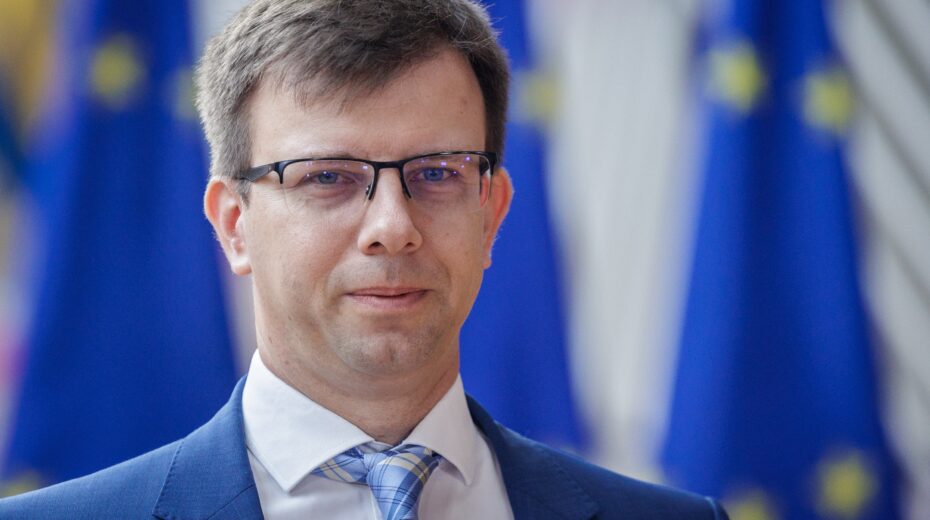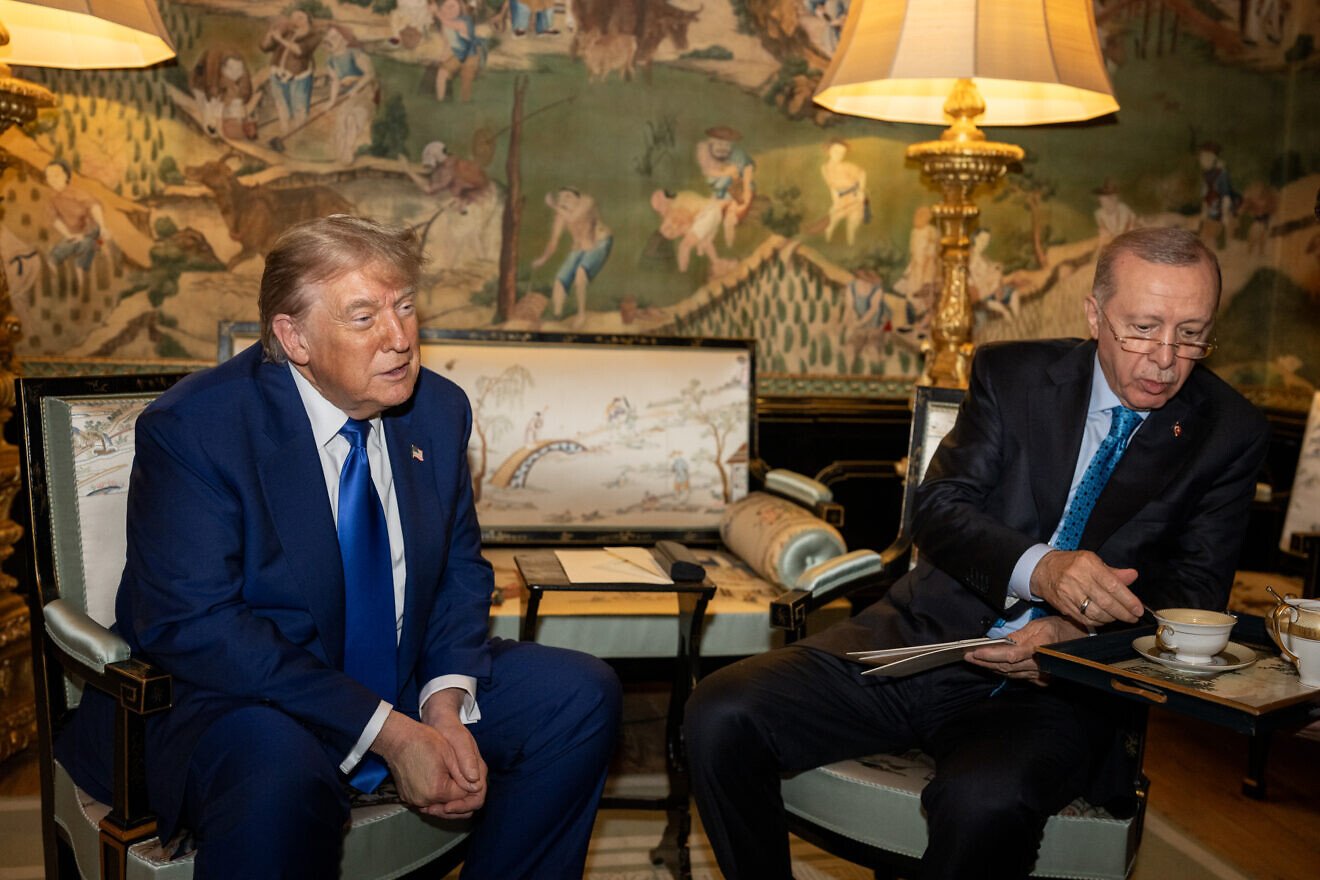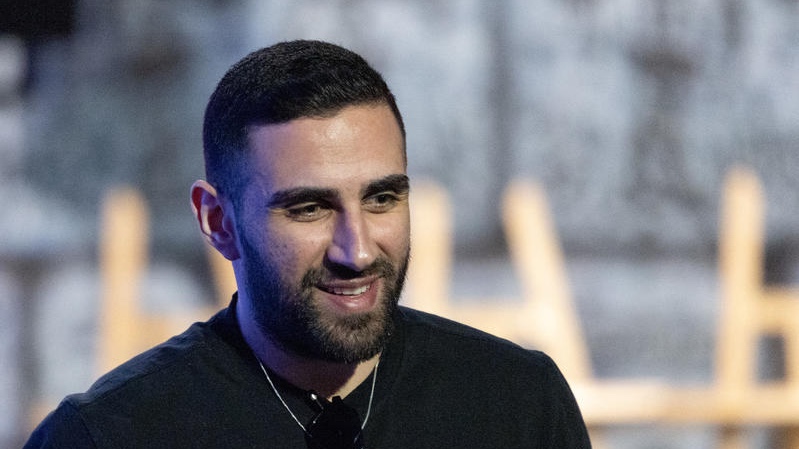(JNS) Europe has shifted on Israel. Since Oct. 7, 12 European countries, including the United Kingdom, France and Spain, have recognized a Palestinian state and now routinely vote against the Jewish state at the United Nations.
One country bucking that European trend is Hungary, which joins the United States and Argentina as among the only countries to vote with Israel consistently at the United Nations. Hungary is also deemed sufficiently safe for Jewish and Israeli institutions that it now hosts many of the Israeli national soccer team’s home games, even as one Israeli club has been banned from playing in the United Kingdom.
JNS sat down on Nov. 21 with János Bóka, the Hungarian minister for European affairs and its prime ministerial envoy to combat antisemitism, to discuss what sets his country apart.
“I believe that the European position has been wrong from the very beginning,” Bóka told JNS, of the bloc’s position on Israel. “This short sighted approach has tremendously contributed to the European Union being sidelined in the Middle East peace process in general.”
“It’s not a coincidence that the European Union is not at the table where things are decided. It’s not a coincidence that the European Union is not able to influence the political agenda anymore in the Middle East,” he said.
“This is a natural consequence of the wrong policy choices that were made,” he added. “We don’t want to contribute to further wrong choices being made on behalf of the European Union.”
In 1988, Hungary’s communist government, under Soviet domination, extended recognition to the Palestinians, which is frequently cited as Hungary recognizing a state of Palestine. Bóka told JNS that is not the view of the current government.
“In 1988, we recognized the Palestinian Authority as the representative of the Palestinians, exercising the right of self-determination,” he said. “In our current understanding, this is not the recognition of a Palestinian state. This is the recognition of the Palestinian Authority as the agency representing the Palestinian people.”
“We believe that the recognition of the Palestinian state is not the beginning of the road. It’s the end of the road,” he said. “A premature recognition, when none of the legal and the factual prerequisites are there. I don’t think that this is conducive to regional stability.”
“I believe that this is exactly the opposite way around,” he added. “It’s a source of instability.”
Bóka told JNS that the implementation of US President Donald Trump’s 20-point ceasefire plan should come before any recognition of a Palestinian state.
“After this is implemented, then the issue of a future Palestinian state might arise somewhere in the distant future,” he said. “For the time being, this is not a priority, and this is not something we should focus on.”
Hungarian Prime Minister Viktor Orbán has pointed to large-scale Muslim immigration to western Europe as prompting a shift in the continent’s attitudes toward Israel and Jews.
In July, he told the Hungarian-language YoutTube program “Warriors’ Hour” that “that’s just how the math works. That’s democracy. And then the Jews will have to pack up and leave.”
Bóka agreed. He sees vindication for Hungary’s strict migration policies in how other European countries have responded to domestic pressure from immigrant communities in the wake of Oct. 7.
“There’s a very strong and direct link between ineffective migration policies and the changing political landscape,” he told JNS. “The very strong demographic tendencies change the fabric of European societies, and at some point, this is something that the political elite can no longer ignore.”
“The political priorities are determined by the domestic political landscape, and in some EU member states, it now politically pays, is beneficial, to play with the vocabulary and with a policy agenda that borders on antisemitism, or even caters for an antisemitic agenda,” he said.
“If you relinquish the right to determine who enters your territory and who stays on your territory, then this will inevitably be the case,” he added.
Earlier this month, Orbán rejected the EU’s asylum pact, intended to share the costs and burden of hosting migrants across the union.
“As long as Hungary has a patriotic government, we will not implement the Migration Pact,” Orbán wrote. “We will not accept migrants and we will not spend a single dime on them.”
Orbán has also expressed a “zero tolerance” policy for antisemitism, saying that unlike other European countries where Jew-hatred has reached “unprecedented proportions,” in Hungary “Hamas flags have never been flown, and will never be flown in the future.”

Israeli Prime Minister Benjamin Netanyahu being welcomed by Hungarian Prime Minister Viktor Orbán and an honor guard in Budapest, April 3, 2025. Photo by Avi Ohayon/GPO.
Bóka said that in Hungary, these policy precepts are linked and have failed in other European countries for the same reason.
“I see a very sad tendency emerging in the European Union,” he said. “The European Union needs to have a strategic and constructive relationship with the State of Israel. I believe that this is conducive to stability in the Middle East. I believe this is conducive to the strategic interest of the European Union on combating illegal migration, fighting terrorism, providing for the energy security of Europe. These are areas where you cannot make any progress without cooperation with Israel.”
“A number of leaders in the European Union are ready to sacrifice this relationship because of domestic political considerations,” he added. “A rising antisemitism is something that some of the leaders are no longer willing to confront, and some of the leaders even exploit for their domestic political agenda.”
Since beginning his second premiership in 2010, Orbán has clashed frequently with billionaire investor and political activist George Soros, a US citizen who is arguably the world’s most famous living Hungarian.
The government’s campaigns against Soros, who is a Jewish Holocaust survivor, over his attempts to influence Hungary through his Open Societies Foundation have prompted criticism from Jewish groups that the images and language used about him flirt with antisemitic tropes.
JNS asked Bóka if he thought that Soros might become less of a salient feature in Hungarian politics after the 95-year-old handed control of his $25 billion investment and philanthropic enterprise to his son, Alex.
“I don’t think that the political objectives of the Open Society Foundation and the networks it operates have changed,” he said. “They took a conscious decision to enter into Hungarian politics. They are basically political actors with political objectives who implement these political agendas through proxies in Hungary and abroad. This has not changed.”
“If you enter into politics, then you shouldn’t be surprised that you will become part of the political discussion,” he added. “You’re part of the political debate, and you will be attacked politically. I think it’s the name of the game.”

Hungarian Prime Minister Viktor Orban speaks with US President Donald Trump before signing the guest book in the Roosevelt Room of the White House, Nov. 7, 2025. Credit: Daniel Torok/White House.
As part of Orbán’s visit to the White House earlier in November, the US State Department declared that US-Hungary relations had reached “new heights of cooperation and achievement.”
But that relationship, much like the US-Israel relationship, now has an increasing partisan divide, with US President Donald Trump describing Orbán as a “friend” who has “done a fantastic job,” whereas former president Joe Biden accused Orbán of “looking for dictatorship.”
“He doesn’t think democracy works,” Biden said during a 2024 campaign stop.
Bóka said that this polarization is present not just in the United States but also in Israel and in Hungary itself.
“It’s very similar in these three countries, but I also believe that we have the proper constitutional and political institutions in place to manage this kind of political tension,” he told JNS.
“In very turbulent times, political polarization only reflects the very high political stakes and the extreme political challenges that we are facing,” he added.
Before the Holocaust, Hungary had the largest Jewish population in central Europe, until the Nazis led the murder and deportation of more than half a million Jews in the final year of the Second World War with collaboration from Hungarian authorities.
Today, it once again has one of the largest Jewish populations on the continent, even as Bóka said that Jewish communities in other countries have told him that they face an “existential crisis” of antisemitism.
“In Hungary, the situation is different,” he said. “I believe in Hungary, Jewish communities don’t feel that, and the majority doesn’t think that Jewish communities should feel that in Hungary, but there’s a common understanding between Jews and non-Jews in Europe that the Jewish communities are in an existential crisis in Europe, and I think that these concerns are well founded.”
According to Bóka, the “most significant attacks against the Jewish communities now come from a very strange political cooperation between the radical Islamist movement and also the radical left that have a very differing view on how society should be organized.”
“But they agree that the traditional European fabric of society, that is based on Judeo-Christian values, the European civilization, is something that should be replaced with something else,” he said. “Everything that we see in Europe, on the streets, in big cities, is part of this very conscious political agenda to replace the Judeo-Christian civilizational periods with something else.”
“The first casualties for this would be the Jewish communities. It usually starts with the Jewish communities to test the immune system of European societies,” he told JNS. “If we fail our Jewish communities in Europe, then we expose the whole European civilization to hostile forces and I think we shouldn’t let that happen.”
Want more news from Israel?
Click Here to sign up for our FREE daily email updates














